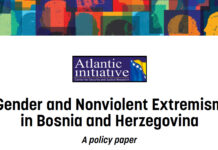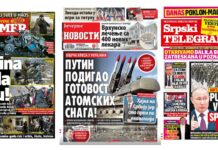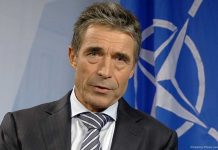On Sept. 22 in New York, the NATO-Russia Council met for the first time after ties were severed in the aftermath of the Russia-Georgia war of 2008. On the eve of the meeting, Ivo Daalder, U.S. ambassador to NATO, dropped a hint about future NATO membership for Russia. While referring to Article 10 of the alliance’s charter, which says NATO membership is open to any European country, he stressed that this article certainly applies to Russia — as long as it meets the alliance’s requirements.
Former U.S. Secretary of State Madeleine Albright, head of a panel working on a new mission statement for NATO, and former NATO Secretary-General George Robertson have also supported the idea of working toward NATO membership for Russia. In addition, Igor Yurgens, head of the liberal Institute for Contemporary Development think tank, has said repeatedly that NATO membership is in Russia’s best interests.
Unfortunately, this is all wishful thinking. There are five main reasons why Russia will never become a NATO member.
1. NATO requires that its members have civilian and democratic control over their armed forces. This is a fundamental principal that allows for military integration and inter-operability among members. Although NATO countries have different political systems — some are presidential republics, others are parliamentary — they all have transparent defense budgets and public and legislative oversight over their countries’ military affairs. This includes independent investigations into military failures and abuses, parliamentary control over how funds are allocating — or not allocated — for weapons programs and constitutional checks and balances on a leader’s ability to send troops to fight in foreign military operations.
In Russia, however, civil control over the military is anathema to the basic principles of Prime Minister Vladimir Putin’s vertical power structure, which has effectively folded all three branches of power into one huge executive branch. Any autocratic power, by definition, rejects public accountability in all spheres of government — and this is particularly true for its armed forces. In Russia, a lack of public and parliamentary accountability allows the Defense Ministry to cover up the true scope of its inefficiencies, blunders and overall backwardness. In addition, a closed military structure also allows rampant corruption at all levels of the military to continue unchecked. As long as the vertical power structure is in place — whether it be headed by Putin or his successor — there will never be civilian control over the military.
Another reason why Russia will fiercely resist NATO’s requirement for transparency in military affairs is that it is hypersensitive about sharing its “military secrets” with NATO — particularly concerning its nuclear forces — even when its so-called secrets are well-known in the West. Nonetheless, a commitment to transparency is a basis for cooperation among NATO members.
2. Russia needs NATO as an “enemy,” not as an alliance partner. NATO is seen by conservative and nationalist forces that dominate the defense and security establishment as an inherently anti-Russian alliance. All the talk about NATO’s revised strategy and focus on new threats — terrorism, sea piracy, narcotics or cyberattacks — is a sham, we are told. The alliance’s real target remains Russia, just as it was during the Cold War. Even Dmitry Rogozin, Russia’s envoy to NATO, wrote on Twitter in March that NATO’s top brass to this day are developing military strategies and plans aimed against Russia.
This fear was reflected in Russia’s latest military strategy, published in February, in which NATO was listed as the country’s No.1 danger. Hardened NATO opponents within the political, military and government-controlled media elite are against any cooperation (including joint projects in Afghanistan) with the alliance, which they view as a tool for U.S. imperialist aggression and military expansion — “an iron leviathan that crushes all humanity,” as Maxim Shevchenko, host of Channel One’s “Sudite Sami” political talk show, described NATO in a September 2009 interview on Ekho Moskvy radio. As soon as Daalder and Yurgens floated the idea of possible NATO membership for Russia, the first thing we heard from many of these opponents was: “Beware of Greeks bearing gifts. This is another NATO trick.”
3. China. If Russia ever became a NATO member, it would extend the alliance’s territory to China, which has a 4,000-kilometer border with Russia. This would upset the tripolar global security balance between NATO, Russia and China, and it would cause China — which is just as suspicious of enemy conspiracy theories as Russia is — to believe that Russia and NATO are joining forces to “contain,” or even weaken, China. It is clearly not in the interests of Russia or the United States, which both have deep economic ties with China, to heighten tensions or provoke China, even if Beijing’s fears are exaggerated.
Moreover, we are told, the possibility that the United States’ or NATO’s next reckless military venture will be aimed at China (or Iran) should not be excluded. If this happens, Russia, as a NATO member, would automatically become a target for a Chinese (or Iranian) counterattack. To avoid this scenario, the argument goes, Russia should insist on strict military neutrality from NATO.
4. The Collective Security Treaty Organization. NATO membership would effectively mean the end of the CSTO, which Russia has worked so hard on since its creation in 2002 to compete with NATO for influence in the global security arena. “I believe it [Russia’s membership in NATO] is absurd,” said CSTO chief Nikolai Bordyuzha on Sept. 16. “What is the sense of NATO membership if Russia has created its own security framework with its allies and this system of collective security functions well?”
Rogozin, for his part, in an April 2009 interview with European-Asian News service, said: “We can handle our security problems independently. … We don’t need NATO.”
5. Russia’s global ambitions. Most important, Russian membership in NATO would all but mean the end of Russia’s dream of restoring its former superpower status. By joining NATO, Russia would effectively become “just another large European country” on the same level as Germany, Britain or France — a “sacrilege” for the derzhavniki, or great-power nationalists, who remember when the Soviet Union was larger and more powerful than these three countries combined.
It would also be an admission that Russia is de facto subordinate to the United States in the world’s largest and most influential security organization, which is unacceptable even to moderate members of the political and military establishment. Although the Kremlin no longer has messianic ambitions to create a Third Rome or Third International, at the very least it will want to preserve its sovereignty and independence as a regional and global power. That will be impossible to accomplish if it becomes a member of NATO with the United States at the helm of the alliance.
The United States’ disingenuous peace feelers to Russia about NATO membership was clearly more PR and provocation than anything else. As President Dmitry Medvedev attends a NATO-Russia Council meeting in Lisbon on Saturday, it would be much better if both sides focus on smaller, more realistic NATO-Russian partnership projects — such as regional missile defense or fighting terrorism together — and forget once and for all about Russia ever becoming a member of NATO.
19 November 2010 The Moscow Times
By Michael Bohm
Michael Bohm is the opinion page editor of The Moscow Times .A-








